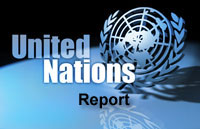
UNITED NATIONS (FinalCall.com) – Forty-speakers addressed the 15-member UN Security on April 6 concerning the commitment of member states to help the people of Haiti move forward with sustainable development.
The discussion is partly-driven by what some see as a need for “affirmative engagement,” a more proactive effort to assist Haiti and proposed economic development strategies that advocates say would help the poorest nation in the Western Hemisphere.
According to the World Bank, the average income for Haiti’s 9.6 million people is $560.00 a year. The Haitian ambassador to the UN told the Security Council 78 percent of his countrymen live below the poverty level–making less than two dollars a day–while unemployment is 80 percent. A World Food Program representative told the council some 2.8 million Haitians are malnourished and cut off from roads, markets and basic services.
The UN discussion about the first free Black republic in this hemisphere came as other activity related to Haiti was underway or on the horizon–and as the island nation struggles with political, economic and social challenges. Four back-to-back storms ravaged the already poor country between August and September 2008, comprehensively destroying what little infrastructure existed and hurricane season is back. A UN force remains in Haiti as part of a process to bring stability.
A congressional delegation headed by Michigan Democrat John Conyers, chairman of the House Judiciary Committee, visited Haiti in early April. According to the Associated Press, the group reviewed operations of agencies involved in drug interdiction, legal immigration and humanitarian development. Rep. Conyers congratulated the Haitian government on improvements made to security in the country.
There will be an international donors’ conference on April 14 in Washington, D.C., hosted by the Inter-American Development Bank at its headquarters. The Development Bank’s general manager for Caribbean nations told the Security Council that the disasters of 2008 called for international financial efforts in Haiti focused on relief and said it was time to review the government’s growth and poverty reduction strategies.
On March 9, UN Secretary-General Ban Ki-Moon and former President Bill Clinton, along with a delegation from the Security Council traveled to the Caribbean nation to urge the government of President René Preval and Prime Minister Michele Pierre-Louis to focus on garment assembly jobs as a way to reduce poverty and spur economic development.
The Haitian mission chief of the International Monetary Fund told the Security Council that Haitian authorities plan to come to Washington to seek $125 million in budget support and approximately $700 million in project financing.
The flurry of activity falls under what the International Crisis Group defines as “affirmative engagement” that focuses on increasing security and embarking on community development projects to create jobs and improve education and health facilities.
The Crisis Group, an independent think tank that gives analysis to governments and intergovernmental bodies such as the United Nations, said in a position paper that the participants at the donors conference must provide an operational reconstruction plan that would identify government-led, community-approved, high-impact and high-visibility projects to tackle food shortages and build support for national reconstruction projects.
Mr. Ban repeated to the Security Council a message shared during a visit with leaders in Haiti and an op-ed published in the New York Times online: Haiti stands a better chance against the global economic emergency because of the U.S. trade legislation known as HOPE II (the Haitian Hemispheric Opportunity Partnership Encourage Act) and the country can increase its prosperity because of this legislation, he said.
According to Mr. Ban, HOPE II provides “a golden opportunity to bring in investments and create hundreds of thousands of jobs.”
HOPE II was co-sponsored by Democratic Congressmen Charles Rangel (N.Y.) and Kendrick B. Meek (Fla.) and expands the benefits for U.S. apparel exports from Haiti by allowing for nine years of duty-free, quota-free access to U.S. markets.
The bill also talks about increasing the pay of Haitian garment assembly workers from $4 or $5 a day to $7 a day. “Haitians working in the textile industry will possess the buying power to help stimulate the Haitian economy,” Rep. Meek said on his website.
Dr. Susan Rice, U.S. ambassador to the United Nations, urged the Haitian government to take advantage of the legislation. “This program moves Haiti towards genuine economic growth,” she said.
Amb. Rice also cautioned those headed to the donors conference to be careful not to view security and development as separate spheres.
The Security Council issued a statement at the end of the all-day session, noting that the “Council reiterates the need for security to be accompanied by social and economic development as a way for Haiti to achieve everlasting stability.”
During the debate in the Security Council chambers, the Cuban envoy told his colleagues that too much attention about Haiti “centered on so-called security matters while minimizing its grave economic problems. To achieve peace, security and stability, first poverty and underdevelopment in Haiti need to be eliminated,” said Amb. Abelardo Moreno. “There is no peace and security for people in hunger.”
Amb. Leo Merores of Haiti congratulated the international community for continued interest in his nation. “The recent high-level visits have been seen as tangible proof of commitment to rebuild the country. Haitians remain committed to building a modern democratic society, one geared towards sustainable development,” he said.












